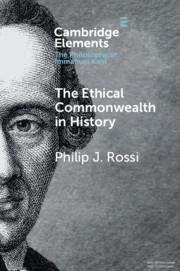Element contents
The Ethical Commonwealth in History
Published online by Cambridge University Press: 01 July 2019
Summary
Information
- Type
- Element
- Information
- Online ISBN: 9781108529686Publisher: Cambridge University PressPrint publication: 04 July 2019
Bibliography
Primary Sources
Secondary Sources
Accessibility standard: Unknown
Why this information is here
This section outlines the accessibility features of this content - including support for screen readers, full keyboard navigation and high-contrast display options. This may not be relevant for you.Accessibility Information
- 17
- Cited by
